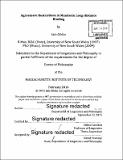| dc.contributor.advisor | Sabine Iatridou. | en_US |
| dc.contributor.author | Giblin, lain | en_US |
| dc.contributor.other | Massachusetts Institute of Technology. Department of Linguistics and Philosophy. | en_US |
| dc.date.accessioned | 2016-07-01T18:45:48Z | |
| dc.date.available | 2016-07-01T18:45:48Z | |
| dc.date.copyright | 2015 | en_US |
| dc.date.issued | 2016 | en_US |
| dc.identifier.uri | http://hdl.handle.net/1721.1/103498 | |
| dc.description | Thesis: Ph. D. in Linguistics, Massachusetts Institute of Technology, Department of Linguistics and Philosophy, February 2016. | en_US |
| dc.description | Cataloged from PDF version of thesis. | en_US |
| dc.description | Includes bibliographical references (pages 249-259). | en_US |
| dc.description.abstract | This thesis investigates the distribution of the Mandarin reflexive ziji. Ziji displays many interesting properties but its long-distance binding distribution has long been of interest to linguists. Ziji displays a blocking effect such that certain arrangements of person features prohibit long-distance binding. In this thesis I argue that the blocking effect pattern is the well-attested Person-Case Constraint (PCC). I argue that ziji is a SE anaphor that is syntactically bound through the agreement system and that the PCC blocking effect emerges when intervention effects disrupt the agreement system that mediates the binding relationship between an anaphor and its antecedent. The conditions required for the syntactic binding of ziji can be explained in terms of an interaction between three processes. First, there is a condition on how the [phi]- features on CO can be valued. C0 bears a [+participant] feature, which it seeks to value subject to CONTIGUOUS AGREE (Nevins, 2007). Second, there is a process of inheritance of the [phi]-features on C0 by all lower instances of TO, following and extending Chomsky (2005, 2008). Finally, there is a condition on the relation between the [phi]-features borne by a particular instance of T and those of its specifier, inspired by Bejar and Rezac's (2009) condition of Match. Because Mandarin T bears no overt agreement morphology, the [phi]-features inherited by T need not correspond to the [phi]-features of its specifier. However, when ziji is not syntactically bound as a SE anaphor it displays a different distribution and it can be used as a SELF anaphor and as a logophoric pronominal. | en_US |
| dc.description.statementofresponsibility | by lain Giblin. | en_US |
| dc.format.extent | 259 pages | en_US |
| dc.language.iso | eng | en_US |
| dc.publisher | Massachusetts Institute of Technology | en_US |
| dc.rights | M.I.T. theses are protected by copyright. They may be viewed from this source for any purpose, but reproduction or distribution in any format is prohibited without written permission. See provided URL for inquiries about permission. | en_US |
| dc.rights.uri | http://dspace.mit.edu/handle/1721.1/7582 | en_US |
| dc.subject | Linguistics and Philosophy. | en_US |
| dc.title | Agreement restrictions in Mandarin long-distance binding | en_US |
| dc.type | Thesis | en_US |
| dc.description.degree | Ph. D. in Linguistics | en_US |
| dc.contributor.department | Massachusetts Institute of Technology. Department of Linguistics and Philosophy | |
| dc.identifier.oclc | 952428356 | en_US |
